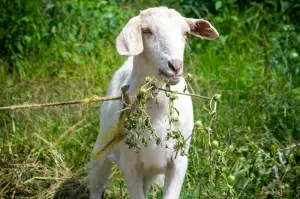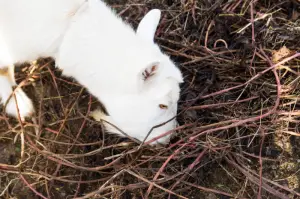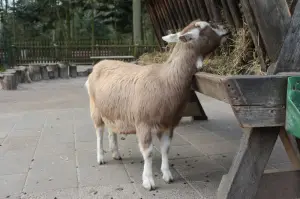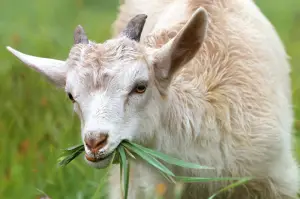Do Goats Really Eat Cans?
We’ve all heard nursery rhymes or seen cartoons where a goat is happily munching on items of clothing, burlap sacks, and even tin cans. This may have caused you to grow up believing goats are the garbage disposals of the farm, with stomachs of steel and no care at all about what they are eating. But are these goat depictions in the media based on reality, or are they entirely fiction?
Do goats eat tin cans? Goats do not eat tin cans, clothes, or garbage. While due to their curious natures, there will always be individuals who will eat anything without discrimination, goats, in general, are quite picky when it comes to what they put into their stomachs and will stick to vegetation.
Goats are unique in the livestock world, with their friendly dispositions and endearing desire to learn about everything in the environment. If you have goats, you will want to know as much as you can about their eating habits, both to provide them with adequate nutrition and to protect them from potential dangers.
Read on to find out more about the surprising foods that goats do eat and some of the reasons behind their can-eating reputations.
How Did Goats Earn Their Can-Eating Reputations? 
The goat’s reputation for eating anything and everything has been around for a very long time, and while there is no telling from exactly where this reputation derived, there are a few reasons that goats give off the impression of being less-than-picky about their diets.
These reasons surround their innate personalities, their natural diets, and their ability to find sustenance in even the harshest of environments.
Goats Have Curious Natures
Have you ever noticed that (human) babies will put everything in their mouths? If so, you may have also heard this behavior described as “oral exploration.” Babies learn about different objects by exploring the tastes and textures of them.
Goats behave similarly – they explore the world and the objects within by mouthing them. When you enter the pen, your goat may immediately start nibbling on your fingers, your hoodie, or your boots.
If given the opportunity, they probably wouldn’t actually ingest your hoodie or your boots (or your fingers – they don’t eat meat). Rather, they are just nibbling to explore. Goats do not have hands with which to learn about their surroundings, so instead, they use their mouths.
Goats Do Actually Eat Some Strange Things
Another reason that goats may have earned their reputation for eating everything is that they do actually eat some things that seem odd or are even inedible to us. Here are just a few examples:
- Tree bark – goats do regularly eat tree bark, and while humans too can eat (or make tea from) tree bark, it is not something that we consider part of our, or any mammal’s, natural diet. In reality, tree bark is a source of tannin, which provides a wealth of antioxidants that help to protect goats from parasitic and fungal infections. The next time you see a goat ingest a strip of bark from a tree, consider that the goat is intentionally eating that bark rather than simply ingesting it because it is in front of her.
- Poison ivy – this one is, in fact, inedible to humans, so seeing a goat eat poison ivy can lead us to the assumption that their stomachs are made of steel. But the anatomy of a goat is different from the anatomy of a human, and poison ivy is not toxic to goats (or many wildlife) like it is to us.
- Thorny brush – goats are perfectly capable of ingesting thorny brush like brambles and roses, but the thought can cause us to shudder since we cannot even tend to these plants without protective gloves. Goats have large teeth that break down the thorns as they munch and thick tissue inside of their mouths to protect them from anything not adequately chewed up. This allows them to tackle thorny brush with ease and is why they are so popularly used to clear land from invasive blackberry brambles.
Goats Are Resourceful 
While goats can be picky eaters, they are also resourceful and adept at surviving challenging conditions. While a goat will not ingest a tin can, you can be sure he will “orally explore” it to determine if there is anything edible and nutritious within.
So while a sheep or other livestock will flatly ignore oddities they may come across in their pastures, a goat will research an object to find out if it is something that can provide him with sustenance.
In fact, stories abound of goats thriving in harsh conditions, living among the carcasses of other animals who were not able to succeed in the environment.
Some Goats Will Eat Anything: Watch Out For The Outliers
Goats are intelligent, and this is what leads them to be especially curious. The goat’s curiosity allows him to be a friendly and sociable companion, but can also get him into trouble. Just look at dogs as an illustration of this.
Some dog breeds are both highly intelligent and prone to eating everything in sight. Ask any veterinarian, and they will have stories about surgically removing socks, entire stuffed animals, and even nuts and bolts out of a Labrador’s or a Husky’s digestive tract. Goats can get into similar predicaments – while most of them will not try to ingest something that is not edible, there will be individuals who just can’t help themselves.
If you have one of these goats, you will need to be extra careful about what is available to him. Don’t leave tin cans in reach. But also, take caution to not leave tarps, feed bags, or baling twine accessible to him. When you bring a towel and a bucket into the pen to clean something, make sure to bring them out with you when you’re done.
When you take off your sweatshirt in the pen while working on something, don’t forget to grab it on your way out. These individuals will be eager to gobble up anything they can, so they will need closer monitoring.
If Not Cans, What Do Goats Eat? 
If you’ve ever watched a herd of goats in a field, you may have noticed that they spend more time with their heads (and mouths) up in the trees rather than down to the ground. This is because, unlike sheep and cattle, goats are browsers, not grazers.
Goats will munch on pasture grasses now and then, but they really thrive off of brush, trees, and tall weeds. This is why it is usually goats who are used to clear land, and not sheep. They may seem to be eating less discriminantly than their small ruminant friends when, in reality, they are designed to require a different type of nutrition. We tend to see neat, lush pastures as the ideal herbivore diet, but one size does not fit all in the animal kingdom.
For this reason, most goats will not thrive on a diet entirely comprised of grass hay, on which another species of livestock may get by just fine. If a goat does not have sufficient land on which to browse, he will need supplemented feed, most often in the form of hay (or grain, when an animal needs to gain weight).
The hay that most closely meets a goat’s nutritional requirements will be legume hay like alfalfa and clover – you may notice your goats will also prefer the legume hay over the grass hay anyway. Goats know what their bodies need and will gravitate toward that which offers them the most nutrients specific to them.
If your goat is eating hay, it is ideal to offer him browse as well, to fulfill not only his physiological need for a varied diet but also his need for mental stimulation. If you have a property large enough to have a couple of goats, you probably also have shrubs and trees as well.
You can add your shrub trimmings, fallen branches, and weeds into the goat pen and allow them to forage through the scraps – this will not only provide them with extra nutrition but will also be a source of enrichment.
Most Goats Are Careful About Their Diets
Goats are actually much more sensitive than we give them credit for, and they must be picky about what they are eating. They also require a higher level of protein and have different nutrition requirements than many other livestock species.
So while you may have grown up with the impression that goats will eat everything in sight, you may instead find yourself with a picky goat who turns his nose up to anything but the highest quality of hay.
If you find yourself in this predicament, try offering opportunities to forage, including brush and trimmings from around your property. And try not to be too discouraged by your goat’s pickiness – after all, it’s a lot better than having the rare goat that will eat everything he comes across.

